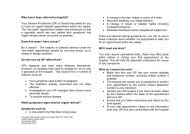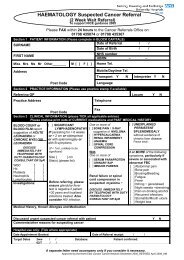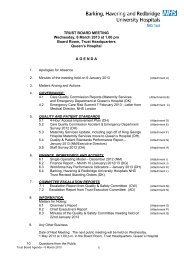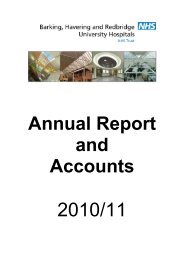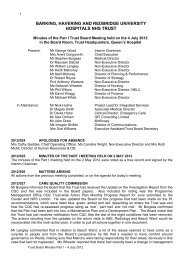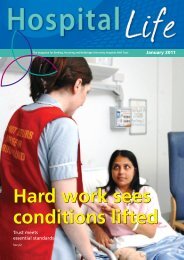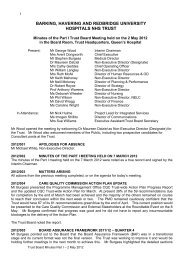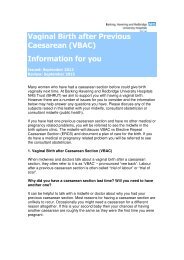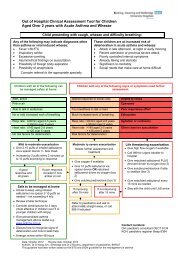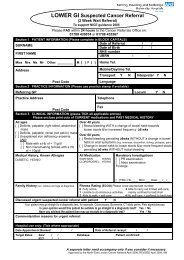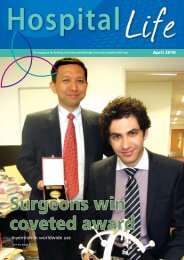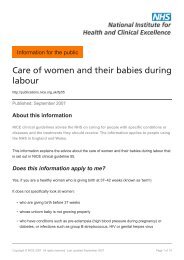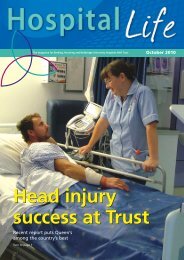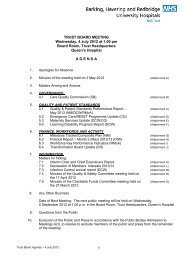BHRUT annual report 2009 - Barking Havering and Redbridge ...
BHRUT annual report 2009 - Barking Havering and Redbridge ...
BHRUT annual report 2009 - Barking Havering and Redbridge ...
Create successful ePaper yourself
Turn your PDF publications into a flip-book with our unique Google optimized e-Paper software.
30<br />
<strong>Barking</strong>, <strong>Havering</strong> & <strong>Redbridge</strong> University Hospitals NHS Trust<br />
5. Review of effectiveness <strong>and</strong><br />
significant control issues<br />
As Accountable Officer, I have responsibility for<br />
reviewing the effectiveness of the system of internal<br />
control. My review is informed in a number of ways.<br />
Executive managers within the organisation, who have<br />
responsibility for the development <strong>and</strong> maintenance of<br />
the system of internal control, provide me with<br />
assurance. The Assurance Framework itself provides<br />
me with evidence that the effectiveness of controls<br />
that manage the risks to the organisation achieving its<br />
principal objectives have been reviewed. My review is<br />
also informed by the Head of Internal Audit’s Opinion<br />
on the overall arrangements for gaining assurance<br />
through the assurance framework <strong>and</strong> on the controls<br />
reviewed as part of the Internal Audit Plan. The<br />
External Auditor’s Local Evaluation Assessment of the<br />
Trust’s ‘Use of Resources’, the Trust’s self assessment<br />
against the Healthcare Commission’s Core St<strong>and</strong>ards<br />
<strong>and</strong> its performance <strong>report</strong>ing also informs my review.<br />
The overall opinion of the Head of Internal Audit for<br />
<strong>2009</strong>/10 is that significant assurance can be given<br />
on the effectiveness of internal control for financial<br />
year <strong>2009</strong>/10. Substantial or adequate assurance was<br />
provided on all of the relevant areas audited, other<br />
than for three areas: temporary staffing, creditors <strong>and</strong><br />
provisions & accruals, where a limited assurance<br />
opinion was given. However, taking into account the<br />
action taken during the year to address these areas<br />
<strong>and</strong> the number of audits with substantial / adequate<br />
assurance, the HOIA was able to issue the significant<br />
assurance opinion overall.<br />
Significant control issues identified through the<br />
Trust’s internal review include:<br />
Finance: The Trust posted a deficit of £22.3M in<br />
<strong>2009</strong>/10, excluding the technical impact of fixed asset<br />
impairments (£31.9M) <strong>and</strong> the impact of IFRS (£2.1M).<br />
The Trust had a deficit control total of £19.7M agreed<br />
with NHS London, which was not achieved primarily<br />
because of a £2.6m affordability issue with the local<br />
PCTs, in respect of additional income recognised by<br />
the Trust in Month 12, above the forecast outturn<br />
previously projected by the Trust at Month 11.<br />
As a result of the deficit incurred in <strong>2009</strong>/10, the Trust<br />
failed its statutory break-even duty at the end of the<br />
financial year. This resulted in the raising of a s19<br />
Report by the Audit Commission. Under s19 of the<br />
Audit Commission Act 1988, an auditor of a health<br />
service body <strong>annual</strong> accounts is required to refer the<br />
body to the Secretary of State where there is reason to<br />
believe that the body or an officer of the body is:<br />
(i)<br />
about to make, or has made, a decision which<br />
involves or would involve the incurring of<br />
expenditure which is unlawful, or<br />
(ii) is about to take, or has taken, a course of<br />
action which, if pursued to its conclusion,<br />
would be unlawful <strong>and</strong> likely to cause a loss or<br />
deficiency.<br />
The Trust first incurred a material deficit in 2005/06<br />
which marked the date of the statutory break even<br />
period. The break even duty requires a Trust to ensure<br />
that its revenue is not less than sufficient (taking one<br />
financial year with another) to meet its outgoings.<br />
The duty is met if, taking a rolling three year period,<br />
expenditure is covered by income. From 2005/06 the<br />
Trust would have been expected to achieve a breakeven<br />
position by March 2008. However, Trust gained<br />
agreement with the Strategic Health Authority to<br />
extend its break even duty over a five year period,<br />
thereby requiring it reach break even by March 2010.<br />
Since 2005/06 the Trust has returned a deficit each<br />
year.<br />
The Trust has therefore been referred to the Secretary<br />
of State because of the failure of its breakeven duty.<br />
The Trust is currently in discussion with the Challenged<br />
Trust Board (CTB) of London PCTs, as part of the<br />
London PCTs’ Medium Term Financial Strategy (MTFS),<br />
to agree a plan which will fund historic deficits, which<br />
stood at £95M at 31st March <strong>2009</strong>, plus the <strong>2009</strong>/10<br />
deficit of £22.3M (excluding the technical impact of<br />
fixed asset impairments <strong>and</strong> the impact of IFRS).<br />
The auditor is also required (under s8 of the 1988 Act)<br />
to consider whether to issue a <strong>report</strong> in the public<br />
interest on any significant matter coming to his notice<br />
in the course of an audit <strong>and</strong> to bring the matter to<br />
the attention of the audited body <strong>and</strong> the public.<br />
Annual Accounts



![[4] Biopsy Leaflet.pub - Barking, Havering and Redbridge University ...](https://img.yumpu.com/51285530/1/190x134/4-biopsy-leafletpub-barking-havering-and-redbridge-university-.jpg?quality=85)
